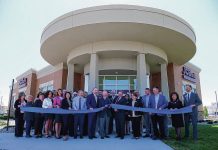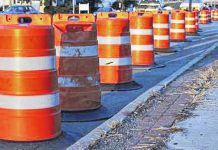A newly appointed city parking commission is considering whether parking meters or kiosks might be a solution to a shortage of on-street parking in downtown Columbus.
During the group’s first meeting, the commission discussed downtown parking issues, including violations of the three-hour parking space limit by long-term visitors such as those who work downtown.
Commission Chairman and City Councilman Tom Dell said that while parking kiosks are always a “sensitive issue,” they could help the city remedy this problem.
“We didn’t realize back in the ‘70s that parking meters really provided a good deterrent from abuses of our prime parking,” he said. “So it encourages turnover, and it discourages long-term parking.”
However, commission member and City Engineer Dave Hayward said that some people might not go downtown if the city puts parking meters or kiosks in.
People would adjust to the change over time, said commission member Jeff Baker.
“Everybody was screaming bloody murder in Bloomington when they first put them in,” he said. “ ‘No one’s going to go downtown.’ Well, from everything I’m hearing, downtown Bloomington has got people parking all of the time, and they’re paying the money. So, once again, it’s behavioral modification. Any time we make changes to anything, we have people that are going to be upset.”
As long as the system is “incredibly easy” to use, people likely won’t be too annoyed by it, Baker said/
The main difference between a parking meter and kiosk is that a meter serves one space, while a kiosk serves multiple spaces, Hayward said. An example would be Indianapolis’ system of pay-at-the-kiosk and putting in your parking space number electronically.
Newer kiosk or meter systems can be more convenient, with features such as entering your license number instead of a parking space number and using your cell phone to add more time, Hayward said. In considering its options, the city could also decide whether individuals have to leave at the end of three hours or if they’d be able to extend their time, he said.
Dell likewise said that there are different models with options for customization — for instance, the city could choose to have people pay when they arrive, or receive a certain number of free hours, or make it so that the longer a person parks, the more expensive it gets.
Creating more parking turnover will help encourage people to go downtown because they’ll know they’re likely to find a space, Dell said.
“The impact of a full area of parking right between Third and Fifth Street is an economic impact on all of the retail businesses,” he said.
The city doesn’t have any price quotes on how much a parking meter or kiosk system would potentially cost.
“The group that was working on this had quotes from 2020 that ranged from approximately $126,000 to $167,000 for 16 kiosks to purchase the units,” he said.
The city has had meters in the past — and, in fact, when the city removed the machines in 1995, they gave residents first option of buying them in an auction.
The possibility of implementing meters or kiosks once more has been discussed in years past, particularly in the wake of a parking study done by Nelson/Nygaard in 2013. The group’s recommendations included creating a city parking commission and adding more paid parking in the downtown area.
However, while meters were discussed by city officials as a result of the study, the idea evidently did not take root. Mayor Jim Lienhoop, who was a councilman at the time, said in an interview that he believes his predecessor was “not too interested in changing the parking protocol downtown.”
Lienhoop said that he’s seen some communities use kiosks or apps to manage parking. These systems seem “fairly easy to use,” but it’s also possible some people might find them more challenging than others, he said.
Since he’s seen these systems work in other communities, the city could potentially make a similar solution work for Columbus, he said. However, he added that the city will wait and see what recommendations come from the commission.
The mayor noted that a system of meters or kiosks would entail not only installation costs, but also costs for maintenance and enforcement.
“Change is always a little bit of a challenge for all of us,” he said. “… I suspect, initially, there’ll be resistance to whatever might come across. But again, we’re not going to try something here that hasn’t already worked somewhere else. And so I would imagine that we’ll be able to accommodate whatever the committee suggests.”
At the moment, the city is just looking to see if changes need to be made and what those possible changes might be, Lienhoop said.
In discussing downtown parking, commission members also considered when the city might resume enforcement in that area. Hayward stated that the city hasn’t been enforcing downtown parking restrictions for a little over a year and isn’t sure when that will restart.
While the pandemic has resulted in an absence of many employees from downtown over the past year or so, some commission members believe it’s time to restart parking enforcement in expectation of their return.
Dell said that while he’s heard that Cummins’ return will be a “slow rollback” starting in September, workers from other companies have already returned.
“Parking issues have escalated since SIHO has brought a lot of their employees back,” he said. “You also have Johnson-Witkemper, who is another big insurance agency. So a lot of people have developed bad habits over a period of time, since we haven’t been enforcing the parking ordinance as it is.”
Dell, who is the co-owner of Dell Brothers (a downtown business), added that he’s had complaints from customers who have to park a couple of blocks away due to a shortage of available spaces.
Baker, who is also the co-owner of a downtown business, said he expects Cummins might return downtown sooner than expected as other companies do the same.
“I would not be surprised if Cummins does maneuvering sooner than they wanted,” he said. “At least, I’m hearing that from a lot of employees who are talking about, they’re just getting frustrated not being in, and they don’t see the reason for it. So then I’d guess that’s going to start faster than we realize. But it already is difficult to find a place to park.”
As the commission discussed the need to restart enforcement, Hayward remind the group that their role is not to make that decision but instead to make recommendations to the Columbus Board of Works. However, he added that the board is expecting them to make a recommendation on enforcement “sometime fairly soon.”
The city has already eliminated the carryout parking signs that some businesses were using during the pandemic shutdowns, Hayward said.
“I think it was something that was very beneficial at the time we implemented it, but I think over time, it’s kind of dissipated and not as needed,” he said. However, he also noted that this could be a topic of discussion in the future.
The city is expecting a return of both downtown employees and retail customers and is trying to anticipate the effects of their return, Lienhoop said. The commission, he said, will look at those effects, along with previous studies, and give the city recommendations about how to proceed.
“My sense is that as long as we have a vibrant downtown and a vibrant downtown economy, we’ll have parking discussions,” he said. “… You’ve got a limited number of spaces and hopefully more people demanding to use those than we have availability. So part of what we’re also trying to do is plan for what happens post-pandemic.”
[sc:pullout-title pullout-title=”Where to learn more” ][sc:pullout-text-begin]
To watch archived video of the Columbus Parking Commission’s May 13 meeting, go to columbus.in.gov/video/live-streaming/ and click on "2021- Special Events."
Other topics of discussion at this meeting included the possibility of an updated parking study, the current system for parking fines, parking garages and lots, accessibility and appropriate signage.
[sc:pullout-text-end][sc:pullout-title pullout-title=”What’s next” ][sc:pullout-text-begin]
Commission members said that, moving forward, Thursday afternoons at about 2:30 p.m. will be a good time for them to meet. While the group is only required to meet quarterly, they said during their initial meeting they will likely meet on a monthly basis at first. The next meeting will be in mid-June.
[sc:pullout-text-end]




